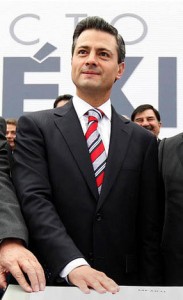Mexico and the New Latin America After Chavez
Hugo Chavez’s presence and undeniable charisma, packed with a strong ideology of social revolution and anti-west creed, quickly positioned him as one of the key players in world politics and one of Latin America’s most important political figures. Without Chavez, the role of regional power leader is up for the taking. There is a debate over whether the future of Venezuela is to continue on the same path envisioned by Chavez under Nicolas Maduro – his personally appointed successor and now officially the sitting president. On the one hand, it is believed that Chavez’s influence was so strong and his philosophy so immersed in the Venezuelan psyche that Venezuela will continue to be one of the key players in Latin America regardless of who leads it, especially with the potential of its oil industry. Conversely, others would argue that Chavez’s extraordinary popularity cannot be matched and his influence will sooner or later fade away. While clearly sharing the same ideology, after his contested and razor thin electoral win it is unlikely that Maduro will manage to sustain and further expand the support of the Venezuelan people and other key regional and global actors; that are, critical for Venezuela’s current power position and influence. Ultimately, this is a matter of personal character.
Can we consider then, that Mexico and its new president to have a shot at regional soft power leader? Peña Nieto –from the center-right PRI– has the tools to bring Mexico to the forefront of Latin American politics. Some might argue that stepping in only after Chavez’s death might send the wrong signal. A signal not of true leadership, but one of seizing an opportunity that was unlikely to present itself with Chavez still in the picture. Regardless, we have to consider the potential this young president has given the new agenda he intends to operate under. He reinstated his party back into the presidency in the latest presidential elections, after it lost its power monopoly in 2000. Although, initially he was believed to be a mere puppet of his party, he promised he would reform his party and has vigilantly campaigned to present the image of the “new PRI”.
From the onset of his campaign and more so after his election, Peña Nieto and his party were compelled to appeal to an unprecedented opposition, comprised for the most part of young people. He is expected to break away from party ties of extreme corruption and prove, especially to his opposition, that his government will be one of opportunity for all and not for further empowerment of those closest to him. With a stronger than ever civil society and a freer media that can and will ensure its government answers to it, democracy in Mexico is finally established. Economically Mexico is also becoming stronger. It has been a consistent advocate of a free market based on international cooperation and currently enjoys one of the strongest economies in Latin America, recently even more so than Brazil’s, and with oil reserves that can potentially, if managed appropriately, get the country to a better position relative to its regional counterparts.
Without understating Mexico’s challenges in controlling corruption, drugs and violence, the country is moving in the right direction, albeit at a slow pace. It is clear as well that the war on drugs, is far from over and that the responsibility for fixing it does not fall exclusively in the hands of the Mexican government, but to its neighbor in the North. Given the undeniable spillover effect of this issue, the US is equally invested in this challenge and joint efforts will signal further cooperation and interdependence not only in security but economically too. More importantly, it has to be recognized that Mexico is not just defined by drug violence.. Peña Nieto is certainly playing the right cards by stressing the rise of the middle class, the use of higher technology, an important manufacturing industry, increasing foreign investment in specialized industries such as airline manufacturing, astonishing tourism riches, greater participation in regional trade agreements, and a strong commitment to reducing drug-related violence.
The question here is whether or not Peña Nieto, backed by his country’s potential will become a critical figure in Latin American politics able to transform Mexico into the regional economic and political power. Considering Mexico’s strong ties with the United States and the West and close friendly relationships with the rest of Latin America, especially through the new Community of Latin American and Caribbean States (CELAC) the task is not impossible. However, one cannot ignore that Venezuela, as of today, still enjoys strong support from other critical Latin American states and maintains important friendships with other global powers. This is not just a matter of strategic regional and global international relations but also personal appeal and time.
*****
Paulina is a second year Master’s Candidate at the Whitehead School of Diplomacy and a Senior Editor for the Whitehead Journal. She specializes in International Economic Development and International Law and Human Rights.


Interesting views and greatly written.